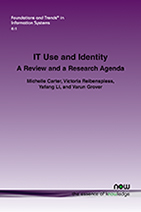IT Use and Identity: A Review and a Research Agenda
By Michelle Carter, Washington State University, USA, michelle.carter@wsu.edu | Victoria Reibenspiess, Washington State University, USA, v.reibenspiess@wsu.edu | Yafang Li, University of Memphis, USA, yli22@memphis.edu | Varun Grover, University of Arkansas, USA, vgrover@uark.edu
Abstract
Over the last 40 years, IT use has become essential to how individuals interact with the world. From ordering meals to taking classes and even consulting a physician, so many aspects of daily life are bound up with IT that effective participation in the world demands IT use. The ubiquity of IT in work and personal lives has created a shift from IT as a tool to IT as a basis of identity formation and verification. In a genuine sense, IT use has become fundamental to how we see ourselves and act in the world.
The essential role of IT use in all aspects of daily life and social interactions has drawn IS researchers’ focus to identity issues. In this stream, IS scholars have examined relationships between IT use and social, role, and person identities and, more recently, IT use as identity (IT identity). Within IS, there is substantial research interest in understanding the complex and constantly changing relationship between people and IT. However, a theoretical review to organize diverse perspectives on IT use and identity to facilitate new theorizing has yet to be conducted.
To that end, this monograph reviews 90 conceptual and empirical IS studies to identify major themes, examine their theoretical foundations, and suggest an agenda for future research on IT use and identity. In total, 24 of these collected papers cited the concept of IT identity (Carter and Grover, 2015). We summarize the trends of the current IT identity research in various fields.
IT Use and Identity: A Review and a Research Agenda
Information technology (IT) use has become essential to how individuals interact with the world. From ordering meals to taking classes or consulting a physician, so many aspects of daily life are bound up with IT that effective participation in the world demands IT use. The ubiquity of IT in work and personal lives has created a shift from IT as a tool to IT as a basis of identity formation and verification, making it fundamental to how we see ourselves and act in the world. The essential role of IT use in all aspects of daily life and social interactions has drawn information systems (IS) researchers' focus to identity issues. In this stream, IS scholars have examined IT implementation and usage as a determinant of identity, a medium for communicating and protecting identities, and how identities influence IT use. In recent years, IT use as identity has garnered interest.
The IS literature on identity is rich and varied. There is substantial research interest in understanding the complex and constantly changing relationship between people and IT. To facilitate new theorizing, this monograph provides a review of diverse perspectives on IT use and identity. This work reviews 90 conceptual and empirical IS studies and identifies major themes, examines their theoretical foundations, and suggests an agenda for future research on IT use and identity.
